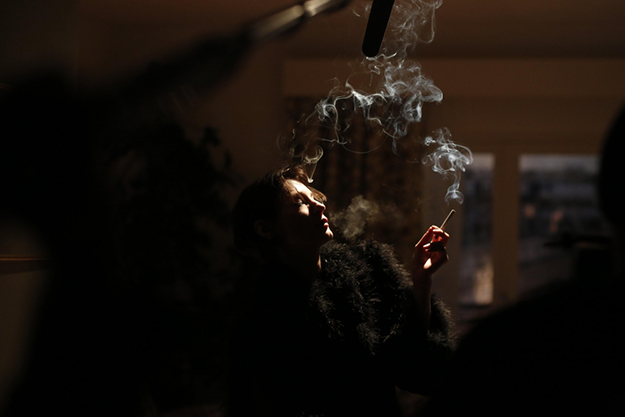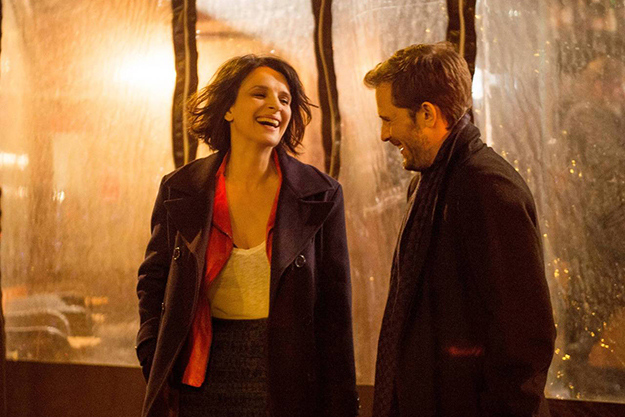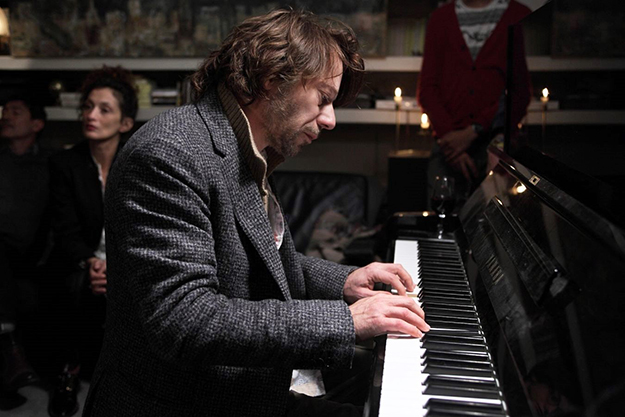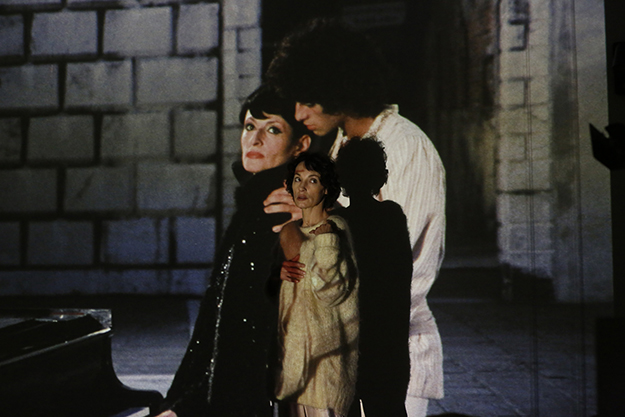Films of the Week: Cannes – Week 1

Barbara
One thing is sure in any edition of Cannes. There will be not just French films, but films of the sort that are often deemed to be “very French.” “Very French” in the sense that they have that peculiar blend of cultural specificity and formal anti-normativity that is an enduring keynote of this nation’s cinema; but also “very French” in the sense that you might not automatically expect them to mean a great deal beyond Paris’s Left Bank.
The first three French features I saw in Cannes this year fit that description to varying degrees. They’re art films about as intransigently auteurist as you can imagine, unashamed excuses for their writer-directors to run wild pursuing their own artistic and stylistic promptings. Two of them I liked a lot; all three absolutely do their own thing, for better or worse. In one, Mathieu Amalric’s Barbara, an actress played by Jeanne Balibar is appearing in a film about the real-life singer Barbara; in one scene, she asks her director, played by Amalric, whether he’s making a film about Barbara or about himself. The answer, of course, is “Both.”
The makers of all three films are telling stories about their subjects and about themselves—which is by no means unusual, but in these cases, taken to an extraordinary degree. I said “the makers,” rather than “the directors” because in the case of Claire Denis’s Let the Sunshine In, it’s not Denis who is turning the mirror on herself, but her co-writer Christine Angot, for whom fictional self-scrutiny is her stock-in-trade. Novelist Angot is a key figure in the French school of writing known as “autofiction,” in which novelistic textures and nonfictional confession or self-scrutiny blur confoundingly. Let the Sunshine In is not about a woman named Christine Angot, although I recognized a couple of characters, or variations on them, from her novel Rendez-vous. At any rate, the film’s protagonist, painter Isabelle (Juliette Binoche), could easily be an Angot surrogate: a recently divorced woman with a powerful erotic drive, a penchant for finding pleasure with the most unpromising partners, and an indefatigable penchant for verbalizing her emotions.

Let the Sunshine In
We first find her having energetic sex with her current lover, a boorish, arrogant, nameless banker played by Xavier Beauvois, a dependable specialist in surly types. She confesses to a friend that what she finds an immediate turn-on with this guy is thinking, “He’s a bastard”: instant orgasm. She later takes an interest in a younger, more presentable man—an actor, played by Denis regular Nicolas Duvauchelle—but he turns out to be a neurotic babbler. She has plenty of those in her life: another is a male friend from the art world, played by Bruno Podalydès, who hits on her over lunch in that detached, slightly theoretical way in which men seem to make passes in such films. There’s also a man (Paul Blain) she spots in a club and then joins in a dance-floor rapture to Etta James’s ballad “At Last.” His faded-rocker looks and almost parodically moody mouth make him so much the kind of dreamboat a mature arty woman might fancy in a French film that you think Denis is having a laugh, pure and simple.
Binoche isn’t always at ease playing comedy: she was an unexpected hoot in Hou Hsiao-hsien’s Flight of the Red Balloon (2007), as a sort of twitchy Parisian version of Jennifer Saunders in Absolutely Fabulous, whereas last year in Bruno Dumont’s Slack Bay, she was a disaster, contorted with mannerism. Here, though, she’s relaxed, nervy, alert, and about as overtly sexy as I can remember seeing her. There’s a fabulous scene with Josiane Balasko, as a gallerist whom Isabelle suspects of having been involved with her ex-husband; Isabelle can’t quite get around to asking her, and the whirl of endless vacillation is delicious. There’s also a wonderful scene of a bunch of artists walking and talking in the country, as if seeing the fields and trees as a site-specific installation; Binoche’s subsequent exasperated rant is a joy. The late Gilbert Adair pointed out that people think that the characters in Eric Rohmer films are witty and intelligent, whereas they only sound smart but much of the time speak well-turned nonsense. It’s a little like that in Denis’s most talky film by far, but while the characters are far from idiots, they often talk in circles, banging on about the same topic and getting nowhere, or just showing off. It’s not what they say, but the way Denis handles the talk: in a long scene in an antiseptically chic bar, Agnès Godard’s camera simply pans back and forth between between Binoche and Beauvois as the characters negotiate their sex life to a backing of gently steamy jazz (Stuart Staples and the Julian Siegel Quartet provide “variations and improvisations” gorgeously).
Also “very French” is a particular disdain for conventional structure. As with the other two French films at hand, there is no sense of organic narrative shape or “normal” closure. This film, which started life as an attempt to adapt theorist Roland Barthes’s work-in-fragments A Lover’s Discourse, remains altogether fragmentary, despite a closing scene in which a fortune-teller (Gérard Depardieu) tries to impose a shape, a direction, even a potential happy ending on Isabelle’s life. As if to say “as if,” Denis starts to run the end credits while he goes on talking. This is not quite the Claire Denis film her admirers might expect, certainly not after her brutally downbeat Bastards. You wouldn’t exactly call it a bagatelle, given the seriousness and complexity of its disquisition on midlife female desire. But lightness is very much of its essence; it defies you to take it too seriously, but implicitly warns you against not taking it seriously enough.

Ismael’s Ghosts
There’s a different playfulness in Ismael’s Ghosts, the latest from Arnaud Desplechin, and the opener of this year’s official selection. As baggy and free-associative as many of Desplechin’s films, it’s a maze with many possible entrances: the one that Desplechin happens to have provided is a corridors-of-power drama about a mysterious, legendarily elusive Foreign Ministry official named Ivan Dedalus (Louis Garrel)—which turns out, after a while, to be a film-in-progress by a director named Ismael, Ivan’s brother. If, that is, Ivan and his adventures aren’t a figment of Ismael’s imagination. The film’s main thrust isn’t to do with Ivan at all, but the tormented life of the ever on-the-brink Ismael, whose current inamorata is Sylvia, an astrophysicist played by Charlotte Gainsbourg. Ismael is played by Mathieu Amalric, previously Despechin’s alter ego in My Sex Life… and My Golden Days; there’s a sort of folie à deux going on when these two work together, Desplechin encouraging Amalric to give vent to his most exalted, even manic emoting. The actor’s wide-eyed angst can be charming as anything, but it’s rather unsettling that, even in a scene where he’s making love with Marion Cotillard, he looks as if he’s just had a nasty shock.
One day, a mysterious woman (Cotillard) turns up and coolly introduces herself as Carlotta, Ivan’s ex-wife, missing lo these 20 years. Carlotta’s otherworldly ways and mysterious glances—which Cotillard does quite unnervingly—put the wind up Ismael and Sylvia in no uncertain terms. Is she real? Real enough to do a bizarre dance routine to Dylan’s “It Ain’t Me Babe.” Cue Ismael’s out-and-out meltdown, as he abandons the shoot of his Ivan movie to hide out at home and set up an installation of paintings and bits of old string, to further his researches into the history of perspective. Desplechin is one of those directors who will wax abstract when they damn well please; seriously, is there any other film industry in the world that would let someone devote a long passage of argumentation to explaining why Jackson Pollock’s Lavender Mist is a remake of Picasso’s Les Demoiselles d’Avignon?
Speaking as a Desplechin agnostic, I can’t say I’m outraged, as some critics here have been, by the self-indulgence of Ismael’s Ghosts; good on him for not boring us, or letting us get too comfortable with a neatly tailored narrative. But here he simply doesn’t seem to have been willing to commit himself to any one of the films that this might have been. Desplechin describes the work, in his Director’s Note, as “a pile of plates of fiction that I will break against the screen . . . Potlatch, fictional overabundance . . . ” There is, apparently, another cut that is some 20 minutes longer, and perhaps more organically “complete” in the standard sense (although you somehow hope it isn’t). As it is, we wander into the labyrinth, and we find ourselves abruptly exiting (after Gainsbourg, breaking the fourth wall, announces, “You’re probably wondering what happened next”). It’s not unenjoyable, but Ismael’s Ghosts feels as if it concerns Desplechin more than it could possibly concern most tolerant audiences. However, it does feature what will surely be the best line in the festival: “Stay away, you old shnook!” Ah, how many times are those words spoken during an average Cannes?

Barbara
Perhaps the most unruly of all three of these films is Amalric’s Barbara, which you might expect to be a showbiz biopic, but is anything but. It’s a meta-biopic, if you prefer—as explained above, it’s not really the story of the French songwriter and performer Barbara, but more that of an actress named Brigitte, played by Jeanne Balibar, who is starring in a biopic of Barbara, directed by one Yves—played by Amalric himself. The hall-of-mirrors construction includes sequences that cut near-seamlessly between 1970s footage of Barbara herself and Balibar re-creating her in backstage moments, plus theatrically heightened scenes, steeped in Hollywood-melodrama lighting, between Barbara and her gambler mother, that turn out (before the set is struck in front of our eyes) to be performed in a studio by Brigitte and an older actress (Aurore Clément). There are episodes that aren’t easy to attach definitively to either Barbara or to Brigitte, or indeed to Balibar, the three slipping in and out of each other’s selves. We certainly see something of Brigitte’s own diva-ish grandeur, when she commandeers a bar for an impromptu performance after running away for a snatched liaison with a young prop man; and we see a lot of Yves’s anguish on and off set (or is it Amalric’s? Or even Ismael’s?). A further level of complexity is added by the inclusion of the character of Barbara’s real-life biographer Jacques Tournier, recalling his meetings with her. And the interweaving of different visual textures in Christophe Beaucarne’s photography is this film’s equivalent of Desplechin’s scattering of plate shards.
If Barbara doesn’t set out to recount a life, it certainly puts a life force on screen. I don’t know how accurate Balibar’s performance is, although the film emphasizes Brigitte’s close study of her model—her turns of phrase, her gestures, her bursts of actressy exuberance and petulance. Balibar—whose own work as a singer was the subject of Pedro Costa’s documentary Ne change rien—gives a majestically flamboyant performance as the singer on- and off-stage, evoking both vulnerability and the distant, knowingly enigmatic self-presentation that had Barbara dubbed “La Dame en Noir” (think of her as a precursor of similarly moody and enraptured Laura Nyro). Balibar’s singing performances are moving and sometimes downright eerie, especially on troubling numbers like “Incestuous Loves.” I went into the film knowing nothing about Barbara’s life, and came out knowing next to nothing—and by all accounts, there was plenty to tell, including stories of abuse by her father. This isn’t a sensationalist biography; it’s barely a biography at all. But it certainly made me want to hear more of Barbara’s haunted, troubling repertoire.
Jonathan Romney is a contributing editor to Film Comment and writes its Film of the Week column. He is a member of the London Film Critics Circle.







